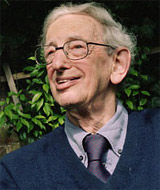What is critical commentary in history?
[Image right: British historian Eric Hobsbawm (1917-2012), one of the 20th-century's most insightful interpreters of history.]
When a history assignment calls for critical commentary, it does not mean simply criticizing or nitpicking. Critical commentary requires more sophisticated thinking, showing your attempt to go beyond mere description of the facts to offer explanations and interpretations of events. Critical Commentary can mean many things [we're not using the term in the sense theologians do]. Here are a few examples. Other types of critical commentary exist, but these examples should give you some idea on how to approach this important element of historical thinking.
- Causality/ ask "why?": What caused the events under consideration? Think of long-term structural problems that may have persisted over centuries. Think of precipitating (proximate) causes that made things happen at a specific time. The historians explains not just what happened but WHY it happened. Explain why something happened--go beyond just describing what happened. Take a shot--Prof. Slatta will give you credit for trying, even if your explanation is wrong. For example, let's say your sources all give examples of poor living conditions for the rural masses. Try to explain WHY those conditions exist. Perhaps the sources point to lack of political power for the rural poor. Why do they lack political power? Historians explain; they don't merely describe or tell a story, so give interpretation a try. Put descriptive evidence into a larger, meaningful context.
- Consequences/ Ask "so what?" OK, you've gathered a number of different sources focused on a single topic. So what? What is the larger significance of the evidence? What are the important results or outcomes? Try to formulate an explanation, an interpretation. Combine critical and creative thinking, as you develop your own unique explanation of the evidence. Try to tie discrete events to the "big picture."
- Argumentation/ Logic and soundness of an argument. Let's say a source makes a statement of opinion or perspective. Is the presentation logical? Does the conclusion flow from the evidence. Is the evidence sufficient to support the conclusion?
- Point/counterpoint: In some cases, you may be asked to compare different perspectives or points of view, as in a debate. In this case, critical commentary means explaining which arguments are the most convincing and why. Show through specific examples which position musters better evidence or exhibits better logic.
- Source criticism: Closely studying the historical sources you have read, looking for signs of bias or incompleteness. If you find evidence of bias based on ethnocentrism, classism, racism, gender, etc., point out the bias and give an example. Perhaps the source has a political or partisan bias--explain what it might be and give an example. Did the source uses the passive voice to avoid responsibility? Politicians love to use the passive voice to mask their mistakes or misdeeds. "Mistakes were made." "It fell between the cracks." Really? No, the evidence suggests you dropped the ball and wish to hide that fact. Point out such failures to explain or take responsibility for actions.